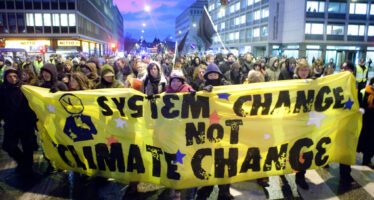7.2 magnitude quake jolts eastern Turkey, hundreds feared dead
![]()
TODAYSZAMAN.COM

Turkish people try to help people on a collapsed building after an earthquake in Van on Oct. 23.
A 7.2 magnitude earthquake rattled the eastern Turkish province of Van on Sunday, triggering the collapse of several buildings and killing many people.
The ?stanbul-based Kandilli seismology center originally reported that the magnitude was 6.6, but later corrected it to 7.2. The quake occurred at 1:41 p.m. Its epicenter was in the village of Tabanli in the eastern province of Van, bordering Iran, but the quake was also felt in the province’s city center as well as the neighboring provinces of Bitlis, Mu?, Batman, Diyarbak?r and Hakkari. The quake struck at a depth of 5 kilometers.
The Prime Ministry’s Disaster and Emergency Management Directorate (AFAD) said in a statement released after the quake that the tremor was strong and caused material damage and some fatalities. It gave no figure for the death toll. The earthquake also toppled some buildings in downtown Van, but the most serious damage was in the neighboring town of Erci?. Several strong aftershocks were also reported. Kandilli also said the quake caused the most serious damage in Van and Erci? and they predicted the death toll to be as high as 1,000.
AFAD said more than 500 search and rescue and health officials were sent to Van from nearly 40 provinces. “There are so many dead. Several buildings have collapsed, there is so much destruction,” Zülfikar Arapo?lu, mayor of Erci?, told NTV television. “We need urgent aid, we need medics.”
Residents spilled out into the streets in panic as rescue workers struggled to rescue people believed to be trapped under collapsed buildings, television footage showed. In Van, at least two buildings collapsed, Bekir Kaya, the mayor of Van, told NTV. One of the collapsed structures was a seven-story building, according to the state-run Anatolia news agency. “The telephone system is jammed due to panic and we can’t immediately assess the full extent of the damage,” Kaya said.
The Turkish Red Crescent (K?z?lay) announced that some 25 buildings, including hotels and a student dormitory, had collapsed in Erci?. K?z?lay immediately began sending aid to the earthquake zone.
They also set up a crisis help desk to oversee developments in the region. K?z?lay has started sending tents, blankets and the other supplies to Van from their logistics depots in various neighboring provinces in the region, especially from Erzurum.
In Hakkari, a town around 100 kilometers (60 miles) south of the city of Van in southeastern Turkey, buildings could be felt swaying for around 10 seconds during the quake. There was no immediate sign of any casualties or damage in Hakkari, about two-and-half-hours drive through the mountains from Van, around 20 kilometers from the epicenter.
The true extent of the damage caused by the quake is not yet known. The US Geological Survey (USGS) reported that the magnitude as 7.2. The USGS originally reported the magnitude as 7.3, but later corrected the figure. It added that the quake had a depth of 20 kilometers (12.4 miles), which is relatively shallow and could potentially cause more damage.
Television coverage showed damaged buildings and vehicles, crushed under fallen masonry and panicked residents wandering in the streets. Turkish media said phone lines and electricity had been cut off. Prime Minister Recep Tayyip Erdo?an will head to Van to see the damage, the media reported.
Earthquakes are frequent in Turkey, which is crossed by several fault lines, and small earthquakes are a near daily occurrence. Two large quakes in 1999 killed more than 20,000 people in northwest Turkey. Two people were killed and 79 injured in May when an earthquake shook Simav, also in northwest Turkey.
Related Articles
UNITED STATES ´S NOTIFICATION ON ITS INTENTION TO WITHDRAW PARIS AGREEMENT ON CLIMATE CHANGE
![]()
On August 4, 2017, United States notified officially to the Secretary-General of the United Nations its intention to withdraw from Paris Agreement on Climate Change signed in December 2015
Now Atlantic is found to have huge ‘garbage patch’
![]()
A huge expanse of floating plastic debris has been documented for the first time in the North Atlantic Ocean. The
De Rio à Cancun : Vingt ans d’injustice climatique
![]()
«Je suis un peu déprimé au sujet de Cancun. Le problème ne s’éloigne pas, il a plutôt tendance à s’aggraver.»



